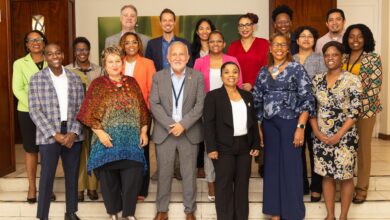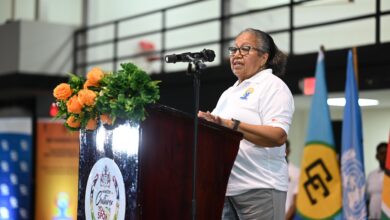“A number of our Member States have made advances in addressing Human Resource for Health (HRH) challenges; however, the Region’s persistent and perennial problem of migration of healthcare workers and, more recently, the COVID-19 pandemic has severely intensified the gaps in availability, distribution and quality of HRH, and placed at peril, hopes for achieving universal access and universal coverage.”
Helen Royer, Director, Human and Social Development at the CARICOM Secretariat
Port-of-Spain, Tuesday 18 June 2024: The Ministry of Health of Trinidad and Tobago, in collaboration with the Pan American Health Organization/World Health Organization (PAHO/WHO), hosted an in-person training on Health Labour Market Analysis (HLMA). The session, followed by the Human Resources for Resilient Health Systems (HRH) Caribbean Roadmap Planning Blended Workshop, jointly organised with the HRH Caribbean Commission, marked a significant milestone for Human Resources for Health in the Caribbean.
Dr Gabriel Vivas Francesconi, PAHO/WHO Representative for Trinidad and Tobago and the Dutch Caribbean Islands, emphasised the importance of the event, highlighting the diversity and common challenges in Caribbean healthcare. He noted that “this meeting provides an essential platform for us to come together, share knowledge, and build strategies informed by solid, evidence-based analysis.”
The objectives of the workshops were to identify actors involved in the development of the HLMA, discuss and coordinate country and inter-country efforts towards using health labour market evidence to shape investments in health, especially the health workforce, and identify countries that will be developing an HLMA.
Reflecting on the COVID-19 pandemic, Dean Chambliss, PAHO/WHO Subregional Programme Director for the Caribbean, emphasised the importance of health workforce planning: “Learning from the lessons of the recent COVID-19 pandemic which highlighted the importance of the health workforce in building more resilient health systems, we recognise that a radical reorientation of health workforce planning, development, and investment is essential.”
Meanwhile, Helen Royer, Director, Human and Social Development at the CARICOM Secretariat, expressed satisfaction with the partnership with PAHO, emphasising that the advancement of the HRH and HLMA initiatives are essential for CARICOM as Member States and other countries in the Americas remain committed to moving the Human Resource for Health agendas forward.
She noted that strategic actions have been taken to address the critical need for HRH. “You would recall that in 2015, CARICOM countries, along with other nations of the world, embraced Universal Health Coverage among the health targets identified and adopted under the Sustainable Development Goals (SDGs),” stated the Director, “In 2017, under the auspices of PAHO/WHO, fifteen CARICOM Member States established the basis for developing the Caribbean Roadmap on Human Resources for Universal Health 2018 to 2022. Regional priorities and collaborative strategies to include governance and leadership, education and training, access and quality, finance, and Human Resources, among others, were set out to move the HRH agenda forward. These priorities resonated with a number of mandates from the Organs of the Community and are reflected in the Health Sector programme of work and a number of major policy and strategic documents.”
Ms Royer explained that the Human Resources for Health Caribbean Commission was established as a permanent body dedicated to addressing regional Human Resources for Health issues in the Caribbean Community. Since its establishment, significant work has been done to define regional HRH policies. Most recently, with the support of PAHO/WHO, a policy brief on healthcare work migration within CARICOM was drafted.
“This HLMA Training exercise now serves to further build capacity in the Caribbean sub-region to objectively appreciate the factors that contribute to healthcare worker shortages, surpluses, skill mix and geographical imbalances and sub-optimal performance,” stated the Director, “Using this standardised approach fosters the potential for the development of evidence-based, harmonised regional policies and strategies targeted at addressing the balance between creating the number and right kind of jobs in the healthcare sector. Therefore, as participants in this workshop, your contributions will be important in implementing this tool at a national level.”
In addition, she highlighted that work would begin shortly to develop the Caribbean Roadmap for Human Resources from 2025 to 2030; the input of Member States and partners will also be critical to ensure that the outcome remains relevant and reflects the subregion’s relative needs.
“As you are aware, a number of our Member States have made advances in addressing HRH challenges; however, the Region’s persistent and perennial problem of migration of healthcare workers and, more recently, the COVID-19 pandemic has severely intensified the gaps in availability, distribution and quality of HRH, and placed at peril, hopes for achieving universal access and universal coverage,” she stated.
Nurse Sherma Alexander-Campbell, National Administrator of Nursing Services at the Ministry of Health, Trinidad and Tobago, remarked, “Human Resources for Health remains of great importance to the Ministry of Health, as we are fully cognisant that the successful implementation of evidence-based healthcare policies and programmes are predicated on the availability of the requisite human resource.”
The HLMA is critical for designing and implementing health workforce plans, strategies and policy interventions. It uses data and analyses to identify trends, challenges and mismatches to provide a comprehensive understanding of the key factors influencing the supply and demand of health workers, thereby identifying policy actions and informing plans for future workforce development. Dr Benjamin Puertas, Unit Chief, Human Resources for Health at PAHO/WHO headquarters in Washington DC, highlighted the impact of a similar workshop conducted in November 2023 in Sao Paulo, which had the participation of 10 countries of South America, where countries have developed an initial outlook of their health labour market. He encouraged Caribbean countries to follow suit, with PAHO/WHO committed to providing ongoing support.
Dr Pascal Zurn, Head of the Health Labour Market Unit at the WHO, identified the HLMA training as key to meeting the benchmarks stipulated by the SDGs. He noted that “the biggest investment to achieve SDG 3, which is ‘good health and well-being’, is a sustainable workforce.” The areas covered by the HLMA include both the labour market in the health sector and the education sector.
This capacity-building event included stakeholders from various sectors, embracing a multisectoral, all-of-government, and all-of-society Health-in-All Policies (HiAP) approach in HRH planning and policy development. Representatives from Ministries of Finance, Labour, Public Service, Education, Social Transformation, and the Environment, along with academia and subnational entities like Regional Health Authorities, were in attendance.
Towards the end of the week, national HRH focal points and other stakeholders from Caribbean Member States joined the group virtually to review the HRH Caribbean Roadmap 2018 to 2022 and chart the way forward for 2025 to 2030. The goal was to update this strategic document based on emerging HRH trends, challenges, opportunities, and priorities thoroughly analysed during the week.
Acknowledgement:
Sections of this media release contain content from the PAHO/WHO – Office of the Subregional Program Coordination (Caribbean)






